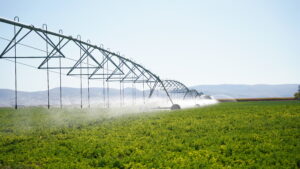Land Consolidation
In parallel with the rapidly increasing global population, the need for food is also rising, which leads to a higher intensity of agricultural activities. The adverse effects of climatic fluctuations on agriculture, incorrect farming practices, and, most importantly, the use of water resources as if they are infinite, despite their limited availability, are among the most significant global issues.
Studies indicate that due to the limited available land for agricultural production, it is necessary to increase the productivity of existing land. The fundamental solution to this is land consolidation through proper planning on the current agricultural lands.
Land Consolidation
Land consolidation is defined in the literature as the process of combining, reshaping, and organizing lands that have been fragmented into small parcels, spread across different locations, or are poorly shaped, according to the principles of modern agricultural management, and in the most suitable way for the provision of irrigation services.
Purpose of Land Consolidation
The goal of land consolidation is to reorganize small, fragmented, and scattered agricultural lands owned by farming operations in accordance with modern farming practices. This process aims to reduce the use of time, labor, and capital, increase production, enhance the efficiency of farming operations, and improve the living standards of the rural population.
Reasons for Land Fragmentation
- Inheritance and transfer through succession
- Sales through division and partition
- Public investments such as irrigation, highways, and railroads crossing agricultural lands
- Sharecropping and tenant farming due to capital and labor shortages
- Natural disasters such as floods, landslides, and erosion
- High population density in the agricultural sector
One of the biggest problems faced in Turkish agriculture is the fragmentation of agricultural lands. These lands are often fragmented, poorly shaped, without road access, and unsuitable for irrigation and drainage, which increases costs for farmers in terms of time, fuel, and labor, ultimately reducing profitability.
These issues show the need to accelerate comprehensive land consolidation efforts. Land consolidation work involves not only the proper organization of fragmented, scattered, and poorly shaped lands but also the establishment of road systems to ensure the economic and efficient operation of agricultural businesses, the construction of irrigation, drainage, land leveling, and soil improvement systems to optimize land use, as well as village renewal projects, the creation of village development plans, and sustainable rural and environmental planning to improve farmers’ working, production, and living conditions and increase their income levels.
Benefits of Land Consolidation
- Fragmented and scattered lands are combined.
- Agricultural lands are transformed into properly shaped parcels.
- Every field is connected to a road and an irrigation channel.
- Transportation becomes easier and more economical.
- Rural settlements are improved and developed.
- The use of agricultural machinery becomes more economical.
- The amount of cultivable land increases.
- Pest control and fertilization are simplified.
- Unused small lands are brought into productive use.
- Disagreements between landowners are eliminated.
- The ideal parcel sizes for fields are created.
- Grazing lands are also consolidated to be suitable for livestock farming.
- Irrigation efficiency and performance in irrigation facilities increase.
- The cadastre is updated.
In recent years, with the increased emphasis on land consolidation, efforts have been accelerated, and farmers are obtaining larger and more regular lands. As a result of infrastructure works such as irrigation canals, drainage systems, and transportation improvements, they are also able to shift to modern agricultural practices.
Consolidation has made it possible to implement the most economical irrigation systems in the world, namely the Atlantis center pivot (circular) and linear (linear) irrigation systems. Using these systems, water savings of more than 50% can be achieved with minimal water loss.
After consolidation, the use of center pivot and linear systems increases irrigation efficiency by ensuring that water is applied to fields at the right time and in the right amount. Additionally, farmers have more flexibility in selecting crops. With larger and more uniform parcels, the area used for cultivation increases, leading to higher yields.
When agricultural lands are small and scattered, farmers are required to travel greater distances to work the soil, plant, irrigate, maintain, and harvest, which results in increased fuel, labor, and time costs. After land consolidation, savings on roads, water, and labor become apparent, further highlighting the advantages of pivot machines.
The initial investment cost is low. Maintenance, operation, design, and installation are quite easy, and labor requirements are minimal. The average lifespan is over 20-25 years. Additionally, nearly 90-100% of the materials used are recyclable, making them environmentally friendly.
By using Atlantis center pivot and linear irrigation systems, our farmers benefit from energy savings, reduced labor, and water conservation, while also contributing to the reduction of environmental impacts.
At Atlantis Engineering, we have been proud to offer such an important product to the world since 1998.
The Atlantis center pivot and linear systems, which operate with electricity and generators, and provide optimal irrigation with low pressure on sloped lands, not only save energy but also reduce carbon dioxide emissions, contributing to a cleaner environment.


itstitle
excerptsa
kamagra pharmacie gratuit pilules
où puis-je obtenir générique kamagra en ligne pas cher
enclomiphene overnight no consult
buy enclomiphene canadian discount pharmacy
buy cheap androxal non prescription online
order androxal lowest price
purchase dutasteride generic is good
online order dutasteride cost tablet
order flexeril cyclobenzaprine canada purchase
flexeril cyclobenzaprine online no perscription overnight
discount gabapentin without prescriptions canada
ordering gabapentin price in canada
buying fildena generic overnight shipping
how to order fildena purchase in australia
how to order itraconazole us pharmacies
order itraconazole generic online pharmacy
buy staxyn cheap next day delivery
online order staxyn generic does it work
buy avodart purchase from uk
buy cheap avodart generic work
order xifaxan cheap store
how to buy xifaxan canadian sales
buying rifaximin cheap prices
rifaximin the 800 number to place order
koupit kamagra havaj online
levné kamagra bez doručení přes noc přes noc